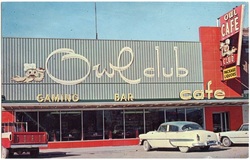
Every year on March 17, St. Patrick’s Day, Alfred and Donna would gather the small savings they'd hoarded all year. With ceremony, after work, they’d find a table in the bar and carefully select numbers in Keno to win big.
They never won big. Some years they didn’t lose big, so they considered that a consolation.
Perhaps there were better uses for their money; Alfred knew that. As Donna said though, “When’ve we ever been smart?” Then she’d laugh and Alfred would feel like the luckiest man alive. Life with Donna was plain fun.
After work, Alfred liked to sit in the coffee shop and wait for Donna to finish her side work, the tasks she had to complete after her shift. She’d sanitize the coffee pots and refill the salt and pepper and sugar shakers, all the while, she’d keep up a lively banter with Amy, the graveyard waitress.
Amy was young enough to be their daughter, almost young enough to be their granddaughter. She seemed older than her years though. She had hooded eyes and a permanent furrow between her brows. She had a little son, Kenny, who she would carry into work every night. Kenny’s dad, Mario, was a cook during the swing shift. Amy would hand Kenny over to his dad, then work her shift.
As far as anyone could tell, the relationship between Mario and Amy was a volatile one. They usually yelled at each other a bit in the kitchen and then Amy would manically smoke several cigarettes in quick succession before she was ready to start her shift. Donna didn’t seem to mind picking up any slack for Amy. The other waitresses on the swing shift would leave as soon as possible but Alfred could tell that Donna felt a motherly inclination to help Amy. And it was plain to see Donna was crazy about Kenny. She’d take him from Amy if she wasn’t too busy. She’d rub his feet if they were cold. Amy didn’t seem to ever manage to put anything on Kenny’s feet.
One Saturday night Donna was finally finishing a long and busy shift. A busload of high school basketball players arrived just as she had poured herself a cup of coffee. Amy was doggedly distributing menus to the noisy crowd. Apparently they had won because they were in a buoyant mood. Donna gave Alfred an apologetic glance because she knew he was tired too and she rose to help Amy. She refilled water glasses and delivered plates of hamburgers and French fries to the hungry kids. She didn’t bat an eye when Amy lied to the first kid that asked for a milkshake. “The machine is broken,” Amy said. The basketball players groaned and Donna thought Amy was a genius. They’d be dishing up scoops of the rock hard ice cream all night to turn into milkshakes if not for Amy’s fib.
Alfred’s heart swelled with affection as he watched Donna. He knew her feet would be swollen and tired tonight. He knew her wrists would ache from carrying heavy trays of food. He also knew she wouldn’t complain.
Finally, the coaches finished their third cups of coffee and gathered the increasingly rowdy group back to the bus. They had several hours’ ride ahead of them. Such was the life of basketball players in rural Nevada.
Amy insisted she’d bus the tables later. She gave Donna more than half of the tips and declared that Donna was done for the evening. As rough as Amy was and as much as she snarled at Mario, she really was a sweet girl, Alfred considered as Donna eased back into her chair. She slipped her feet out of her orthotic shoes.
“Ooowhee, my dogs are barkin’ tonight,” she said, rubbing her stocking feet together. Alfred smiled at her. Even though they’d lived in Nevada for nearly 12 years, Donna still sounded like Alabama. It was music to his ears.
“This coffee,” she said, thrusting the cup away from her, “Is colder’n my heart.”
Amy was already bringing a fresh cup to Donna. “Thank ya kindly,” Donna said, “How’ve ya been, m’ girl?”
“OK. Thanks for helping,” she said, blowing her bangs off her face. They fell back down over her eyes. “Those kids are such a pain.”
“No problem, Hon’,” Donna said. She sighed and sipped her coffee.
Alfred wanted to remark that the ‘kids’ were not much younger than Amy but he didn’t.
“Where’s m’ baby?” Donna asked Amy.
“Mario took him home, I guess.” The two prattled on in a discussion about teething. Alfred wondered how women could talk for so long about children. They had never been blessed with children of their own but Donna was the oldest of 13 and she knew a thing or two about teething. Amy said, “Kenny’s getting close to walking. He stood up all by hisself in the middle of the room today.”
“Ain’t that somethin’?” Donna said. Then she seemed to remember Alfred and the late hour. “I guess I’d best git these ol’ bones home,” she said with a sigh.
“Yes, ma’am,” Alfred said, standing up.
Alfred helped his wife into her jacket, which was much too lightweight for the cold winter night.
Alfred wanted to buy nice things for Donna. He wanted to buy Donna jewelry, a fancy trip, at the very least, a warm coat. Every winter she’d layer a hooded sweatshirt under another sweatshirt and top it with a lightweight coat that had been left behind in the restaurant for so long that Cindy, the restaurant manager, told Donna to take it. He wanted a nicer car (the one they drove was anything but nice with all its dents and rust—the rips in the seat were duct taped and the air conditioning didn’t work. It also burned oil but oil was easy enough to replace).
Check back tomorrow for more of Alfred and Donna's story!
They never won big. Some years they didn’t lose big, so they considered that a consolation.
Perhaps there were better uses for their money; Alfred knew that. As Donna said though, “When’ve we ever been smart?” Then she’d laugh and Alfred would feel like the luckiest man alive. Life with Donna was plain fun.
After work, Alfred liked to sit in the coffee shop and wait for Donna to finish her side work, the tasks she had to complete after her shift. She’d sanitize the coffee pots and refill the salt and pepper and sugar shakers, all the while, she’d keep up a lively banter with Amy, the graveyard waitress.
Amy was young enough to be their daughter, almost young enough to be their granddaughter. She seemed older than her years though. She had hooded eyes and a permanent furrow between her brows. She had a little son, Kenny, who she would carry into work every night. Kenny’s dad, Mario, was a cook during the swing shift. Amy would hand Kenny over to his dad, then work her shift.
As far as anyone could tell, the relationship between Mario and Amy was a volatile one. They usually yelled at each other a bit in the kitchen and then Amy would manically smoke several cigarettes in quick succession before she was ready to start her shift. Donna didn’t seem to mind picking up any slack for Amy. The other waitresses on the swing shift would leave as soon as possible but Alfred could tell that Donna felt a motherly inclination to help Amy. And it was plain to see Donna was crazy about Kenny. She’d take him from Amy if she wasn’t too busy. She’d rub his feet if they were cold. Amy didn’t seem to ever manage to put anything on Kenny’s feet.
One Saturday night Donna was finally finishing a long and busy shift. A busload of high school basketball players arrived just as she had poured herself a cup of coffee. Amy was doggedly distributing menus to the noisy crowd. Apparently they had won because they were in a buoyant mood. Donna gave Alfred an apologetic glance because she knew he was tired too and she rose to help Amy. She refilled water glasses and delivered plates of hamburgers and French fries to the hungry kids. She didn’t bat an eye when Amy lied to the first kid that asked for a milkshake. “The machine is broken,” Amy said. The basketball players groaned and Donna thought Amy was a genius. They’d be dishing up scoops of the rock hard ice cream all night to turn into milkshakes if not for Amy’s fib.
Alfred’s heart swelled with affection as he watched Donna. He knew her feet would be swollen and tired tonight. He knew her wrists would ache from carrying heavy trays of food. He also knew she wouldn’t complain.
Finally, the coaches finished their third cups of coffee and gathered the increasingly rowdy group back to the bus. They had several hours’ ride ahead of them. Such was the life of basketball players in rural Nevada.
Amy insisted she’d bus the tables later. She gave Donna more than half of the tips and declared that Donna was done for the evening. As rough as Amy was and as much as she snarled at Mario, she really was a sweet girl, Alfred considered as Donna eased back into her chair. She slipped her feet out of her orthotic shoes.
“Ooowhee, my dogs are barkin’ tonight,” she said, rubbing her stocking feet together. Alfred smiled at her. Even though they’d lived in Nevada for nearly 12 years, Donna still sounded like Alabama. It was music to his ears.
“This coffee,” she said, thrusting the cup away from her, “Is colder’n my heart.”
Amy was already bringing a fresh cup to Donna. “Thank ya kindly,” Donna said, “How’ve ya been, m’ girl?”
“OK. Thanks for helping,” she said, blowing her bangs off her face. They fell back down over her eyes. “Those kids are such a pain.”
“No problem, Hon’,” Donna said. She sighed and sipped her coffee.
Alfred wanted to remark that the ‘kids’ were not much younger than Amy but he didn’t.
“Where’s m’ baby?” Donna asked Amy.
“Mario took him home, I guess.” The two prattled on in a discussion about teething. Alfred wondered how women could talk for so long about children. They had never been blessed with children of their own but Donna was the oldest of 13 and she knew a thing or two about teething. Amy said, “Kenny’s getting close to walking. He stood up all by hisself in the middle of the room today.”
“Ain’t that somethin’?” Donna said. Then she seemed to remember Alfred and the late hour. “I guess I’d best git these ol’ bones home,” she said with a sigh.
“Yes, ma’am,” Alfred said, standing up.
Alfred helped his wife into her jacket, which was much too lightweight for the cold winter night.
Alfred wanted to buy nice things for Donna. He wanted to buy Donna jewelry, a fancy trip, at the very least, a warm coat. Every winter she’d layer a hooded sweatshirt under another sweatshirt and top it with a lightweight coat that had been left behind in the restaurant for so long that Cindy, the restaurant manager, told Donna to take it. He wanted a nicer car (the one they drove was anything but nice with all its dents and rust—the rips in the seat were duct taped and the air conditioning didn’t work. It also burned oil but oil was easy enough to replace).
Check back tomorrow for more of Alfred and Donna's story!

